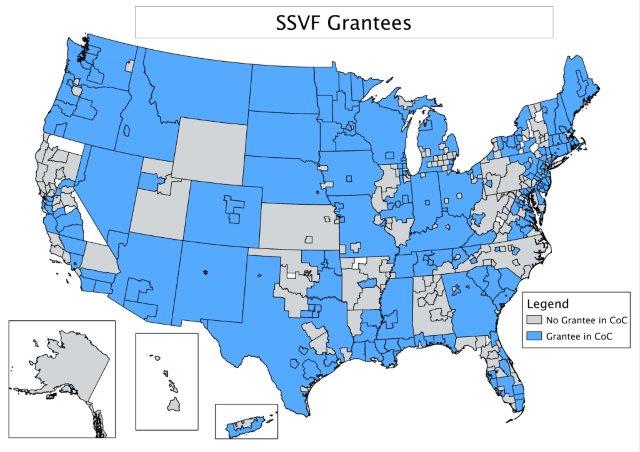
For those unfamiliar with the program, it’s a first-of-its-kind community-based initiative for VA. The competitive grant program, employing the principles of Housing First to assist Veteran families at imminent risk for losing their housing, helps to maintain safe permanent housing. Importantly, the program helps by rapidly re-engaging with permanent housing and other support structures to achieve quick housing outcomes and community integration.
Today, in 321 communities across America, program grantees are blazing new trails serving Veteran families unlike any other time in our nation’s history. From my former perspective of running Rochester, New York’s Veterans Outreach Center, one of VA’s original 85 VA grantees, and now as Senior Director for Community Engagement and Innovation at Syracuse University’s Institute for Veterans and Military Families, there is no more transformative vehicle serving Veteran families than SSVF. Its strengths lie in its flexibility, Veteran family-focus and community basis.
VA’s SSVF capacity represents the basis by which communities are building additional capacity around the federal government’s investment in supportive services for Veteran families, transforming the very means by which communities approach and deliver their collective resources to serve America’s Veteran families. In so doing, they’re also simplifying access to high quality services and resources best designed to meet their needs.
In New York State communities where VA SSVF resources have been established, Veteran families are now routinely accessing community-based case management, legal resources, financial coaching and counseling services, employment and education counseling, and even peer-to-peer resources. All are aligned and funded through SSVF grants, in integrated and potentially leading practice fashion, to put their community capacity to work serving Veteran families.
SSVF’s collaborative nature lends itself nicely to improved coordination and communication within supporting Continuums of Care (CoCs) by empowering a shared and collective responsibility to serve Veteran families. SSVF programming offers CoCs meaningful Veteran family-specific resources to address immediate housing needs and supportive services to sustain their needs beyond securing housing first.
While SSVF really drives a community’s Housing First approach for Veteran families, we’re also observing New York State CoCs building value around SSVF capacity by creating coordinating instruments to share their value. On Long Island, the CoC established a Veterans’ Advisory Board to create more knowledgeable CoC members on issues affecting Veteran families, thus building out their community of practice itself. In western New York, SSVF grantees actively lead ongoing Housing First practice discussions that help their CoCs better coordinate their limited resources. Elsewhere, Memoranda of Understanding (MOUs) are springing up in CoCs around Veteran family referrals to ensure the right interventions are occurring regardless of where the family first entered the CoC. All three of these examples illustrate the additional value VA SSVF grantees can play within their CoCs.
Across New York, VA SSVF grantees are leading efforts within their CoCs to better share data and information to track outcomes associated with Veteran families served. In major metropolitan centers where multiple SSVF grantees are operating alongside one another, coordinating SSVF capacity has taken on greater importance and is proving invaluable to the community’s ability to better understand rates of Veteran homelessness, its underlying issues, and the resources being applied to help solve Veterans’ housing needs.
From my foxhole, it’s refreshing to see the significant change VA SSVF resources are having on their communities. SSVF is not only working to improve the lives of our Veteran families, but it also has a huge impact on CoCs and their communities, the newest platforms by which to serve those who serve our country.
Retired Col. Jim McDonough is the Senior Director for Community Engagement and Innovation at the Institute for Veterans and Military Families at Syracuse University (IVMF). He is the past Director of the New York State Division of Veterans Affairs and a Veteran of Operation Iraqi Freedom. He resides in Saratoga Springs, N.Y., with his family.
Topics in this story
More Stories
The Social Security Administration is hoping to make applying for Supplemental Security Income (SSI) a whole lot easier, announcing it will start offering online, streamlined applications for some applicants.
Yusuf Henriques, an Army Veteran and former combat medic, is the founder and CEO of IndyGeneUS AI, a genomics company on a mission to improve health equity by increasing representation of women and racial minorities in clinical trials.
Online shopping scams are the riskiest scam for Veterans, with 77.3% of reports confirmed losing money when targeted by this scam.






